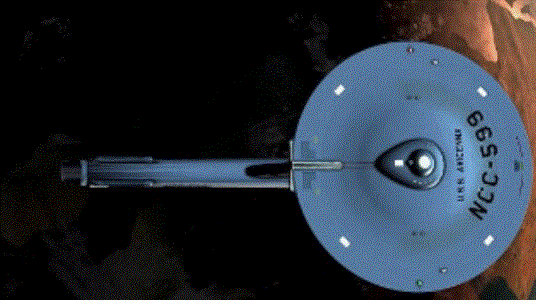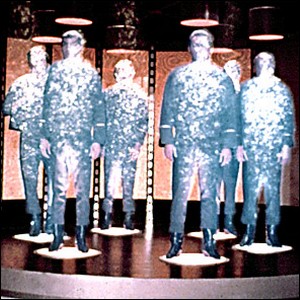On Wednesday, December 16th, two of the three of us met online for the third session of the Pilot Episode of the campaign.
If you are wondering what is meant by the use of the word campaign in my posts, I mean an ongoing game with a specific organizing principle. Ongoing tends to mean ‘until we decide to stop’. That is a common default for me, but sometimes campaigns are set to be limited to a specific number of sessions. That latter usage, however, tends to be qualified with an adjective such as “short”, or “10-session.”
First Response’s organizing principle is that I am running it for Ron, KC, and Joseph in the Original Series Era, with the characters being crew of the USS Avicenna with its Crisis Response duty assignment. No printed adventures are in use, and the campaign is not following a planned ‘adventure path’ nor is their an intention to facilitate a dramatic arc of some kind. This campaign is built from our discussions from before and during and after Session 0 with the influences of a short list of Original Series episodes, the characters, and ‘crisis response’ being given equal weight in preparation for play. The intent is to be reminiscent of episodic television wherein the series has self-contained episodes in the same setting, featuring the same characters.
This session was conducted with only two of the three Main Characters present, Ensign Yang and Lt. Korsakov. They embraced the notion of responding selflessly to the crisis and have pushed through uncertainty into a larger problem they may have found a good solution for… if they can pull it off! Likewise, the crew aboard the USS Avicenna found themselves juggling chaos on several fronts ranging from Starfleet communiques to alien probes.
Anthony’s Reflections on Part C
KC’s reflections (due later in the week, including full-episode commentary track)
A recurring question has been about the relative level of difficulty the game’s competent characters face in their missions and the role of the Momentum Resource in buffering them from harm. I believe this has been inspired in part by the relative rareness of characters *this* competent in RPGs and by the approach I am taking as a guide into the rules. That approach is to establish basic competence with the core mechanisms (Part A) then shift to presenting rules in support of player action (Part B onward). Actions aboard ship are, understandably easier than those taken in hostile environments, and cautious or insightful play will obviate dangers less astute gamers might bring on themselves~
As Ron notes in a reflection, we won’t be able to answer the question of how much risk the game offers and how much weight are on the dice until several episodes have given us perspective, but I hope we enjoy the ride to that perspective!



9 responses to “Star Trek Adventures – First Response – Session 3 (Pilot, part C)”
Hurray for the secondary characters!
I really liked seeing Anya and Mbuto in action, and it's cool to see how functional it is to have these characters move from participant to participant, even within a single session. A few sessions of Ars Magica I played in the '90s flirted with this kind of play, but didn't last long enough to really explore the possibilities.
I am a fan of troupe play
I am a fan of troupe play from a stable of characters – some yours, some open to all. I came into the hobby with this as a factor via hirelings, but that did not last long. I brought it back into my gaming with Call of Cthulhu as a means to enable long-form play (generation games).
Star Trek Adventures manages to neatly present a way to make the ship feel full without requiring a lot of work or maintenance, so I am quite taken with that aspect of play. I also quite like it as a means to dump the somewhat unworkable notion of only the Main Characters' decisions mattering. While the player might be focused strongly on an element in play (Kirk in Obsession, Season 2) the crew still knows that they have to do their jobs~
my favorite Saturday Evening TV-show
As Rod I absolutely love the secondary characters, Anya is a kindred soul for sure as far as I'm concerned.
I have to admit I watch the actual play mainly for entertainment but I truly appreciate the reflection videos, they give me a lot to think and reflect about. Thanks to everybody involved for the amount of time and engagement you put into this endeavour.
The quantity of material is a
The quantity of material is a little scary. I was looking forward to the Runeslinger method of play + independent reflections. You can probably see that I've adopted a casual version of it for myself regarding most of the games I've been playing lately, and that's a direct result of following Anthony's YouTube channel. I'm enjoying it very much especially as a social reinforcement of play.
I think that it also carries the risk of overreacting both to a bit of play and to one another's contributions. I'm talking here about my responses, few of which you've seen because I'm trying to recognize and dismiss them before seizing my microphone, not anyone else's toward me. I can interpret a minor "lean" in presentation/narration or a single decision for a given action during play, as if it were a whole personality or play-preference, and I can receive a casual what-if or h'mmm during a reflection as a position statement or challenge.
I can also see that I'm making it easy for others to overreact, in the way I'm presenting things. For example, obviously I can't shut up about whether the Momentum system in this game is an overly-safe safety net, and since this would be maybe five or six times I've said so for just three sessions of play, it probably looks like a deep and committed criticism of the game. Whereas between my ears, in terms of commitment to the issue, it's been "stated" only once as a real concern that has yet to be assessed, and I'm merely maintaining that statement. I'd certainly assess it in terms of evidence only after several episodes of play, with one-to-a-few sessions each … but looking over my videos, I can see that one would reasonably think that each repeated mention escalates my (presumed) conclusion as if I were making that case now.
In a recent conversation with Anthony I mused about whether, for a game like this which has non-session "episodes," I might suggest framing all of our preparation, reflection, and what-was-I-thinking input per episode rather than per session. That's no criticism of what we're doing now, but rather my thoughts for promoting a similar activity via the Spelens Hus games.
I am glad that the videos
I am glad that the videos provide entertainment, and that you are getting some value from the Reflections videos. As I noted in the beginning, there are way too many for the amont that is being done in play and this volume of posting will not continue in future episodes. KC and Ron were keen to post per session, and I saw the value in it for the pilot – but once the pilot is over, I will follow the original outline of preparing one video that tracks the preparation I have done for the episode, one for reflections on how things turned out, one (if necessary) for "what were you thinking?" and a number that deal with concepts that people struggle with when getting into the game – like the video on Rank. I like to do videos like that, but not when I am not playing the game.
I hope that KC cotinues his commentary videos on each session, though. That is a nice touch. It might be fun and interesting to do one as a full group.
reply to Rons reply … which has no reply button for me 🙂
I do see the risks with this approach though, talking from the sideline, the benefits seem to outweight them. Actually I feel inspired by the player reflections to try something like it myself (right now especially with regard to Mountain Witch) but as I have no idea about how to produce a video that will not happen. Writing down ones musings during an ongoing game that people still might want to play has a very obvious risk of spoiling everything. So I'm writing down my thoughts onto the hard disk or hope I'll keep them in mind. So far I've found that I do not like them any longer after some time, which might be as well.
during an ongoing game people
during an ongoing game people might want to watch I meant.
Awkwardness introducing a technique
In his reflection, Anthony says he felt he handled the introduction of a cut scene and a flashback in an awkward way. He also said that, had the players been more familiar with his style, they would have caught on to the flashback without the need for context. I wonder if this worry arises more from the awareness of performing for a video than from the play around the table?
Being recorded or observed
Being recorded or observed doesn't bother me. On reflection between play and watching the session, what struck me about my own performance in play was -and this is in the reflection video -the force of habit.
Once I could review the recording, I could see that I am having a pretty good time, and exploring the way KC and Ron are playing. It isn't as clear cut or as awkward as it felt, but regardless, I slip into behavior I had decided not to use 2 out of the 3 times that I could recall.
I bring it up in the reflection video because I want play to be as efficient as possible given the limited time. There is no time to do each scene frame 1.5 or 2 times. Also, these videos serve as a model of review of a recent session to identify things in need of change or that should be kept.